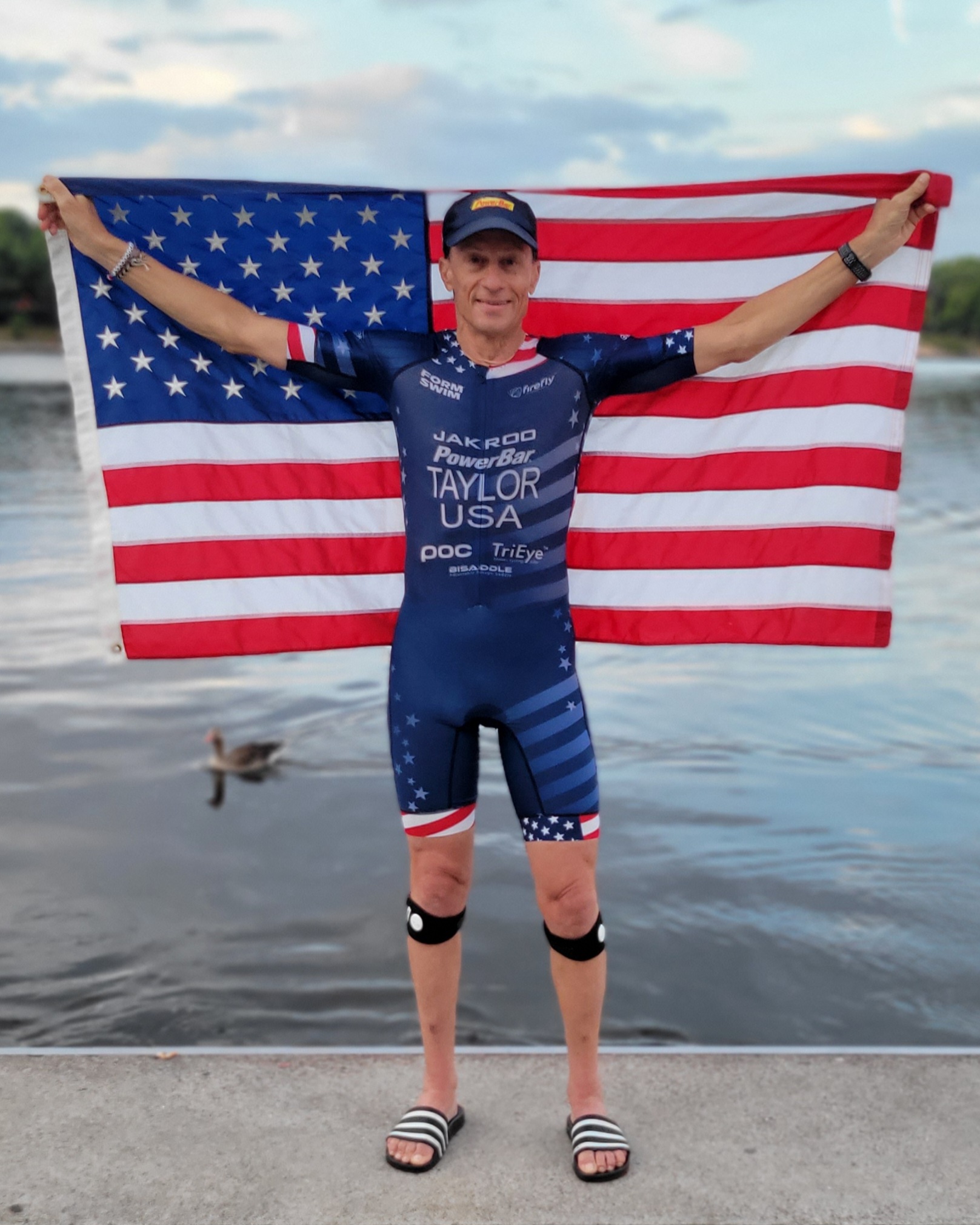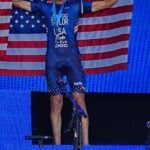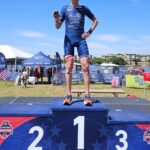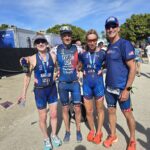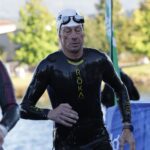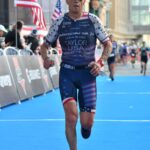I competed last week in the World Triathlon Sprint Championships held in Hamburg, Germany. I raced in the Sprint and Mixed Team Relay events. These two races were one of four “A” race series that are my focus this season.
 I entered the events completely healthy for the first time in several years and my coach, Dr. Greg Rhodes, was masterful in building my fitness and managing my volume, intensity, and recovery. I approached the racing physically rested and energized, and mentally positive, motivated, and excited.
I entered the events completely healthy for the first time in several years and my coach, Dr. Greg Rhodes, was masterful in building my fitness and managing my volume, intensity, and recovery. I approached the racing physically rested and energized, and mentally positive, motivated, and excited.
Also, on a positive note, after many decades of international travel in which I struggled with jetlag, I finally figured out how to deal with it effectively. I stayed awake both flights to Hamburg (I used to try to sleep as much as I could on the overnight flights), stayed up all day upon my arrival, went for a short run, and took to Melatonin tablets before going to bed around 9pm local time. But, as always happens due to jetlag, I woke up around 1am and, in the past, I would stay awake the rest of the night. But this time, I took 10mg of Ambien which put me to sleep till my more normal wake-up time of 6:30am local time (Disclaimer: I am not recommending the use of Ambien for others because it is a controlled substance that can have unusual side effects. I have used it for many years when I travel abroad. Please consult your physician). I repeated this nighttime routine every subsequent night and slept well throughout the night. For the first time when racing internationally, I was rested and ready to go on both race days.
jetlag, I woke up around 1am and, in the past, I would stay awake the rest of the night. But this time, I took 10mg of Ambien which put me to sleep till my more normal wake-up time of 6:30am local time (Disclaimer: I am not recommending the use of Ambien for others because it is a controlled substance that can have unusual side effects. I have used it for many years when I travel abroad. Please consult your physician). I repeated this nighttime routine every subsequent night and slept well throughout the night. For the first time when racing internationally, I was rested and ready to go on both race days.
On a less positive note, I also entered the races with some outcome expectations (which violated everything I tell the athletes I work with!) that caused me to feel some anxiety leading up to my first race, the Sprint. Given that I earned my first World  Championship medal in the Super-sprint in Abu Dhabi last November and I finished first, second, and second in the Super-sprint, Sprint, and Mixed Team Relay at the Multisport National Championships in TX in April, I was focused on at least one podium in Hamburg.
Championship medal in the Super-sprint in Abu Dhabi last November and I finished first, second, and second in the Super-sprint, Sprint, and Mixed Team Relay at the Multisport National Championships in TX in April, I was focused on at least one podium in Hamburg.
What made these races unusually difficult was the late start times (12:20 for the Sprint and 4:18pm for the Mixed Team Relay), which gave me plenty of time to just sit in my hotel room in the hours leading up to the race and just dwell on it.
Though I didn’t practice what I preach with respect to my outcome expectations, I did practice what I preach when it came to how to deal with them. Whenever that “pink elephant” (that’s what I call anything big, heavy, and unhelpful that gets into our minds and is difficult to remove) entered my mind, I would refocus on a “blue hippo,” in which I would shift my outcome expectations (“I have to podium at these races.”) to outcome goals (“I would like to podium at these races.”), which takes the pressure off, after which I make one more mental shift to a “green rhino,” which signifies for me process goals, in other words, what I need to do in my preparations and race execution to achieve my outcome goals.
races.”) to outcome goals (“I would like to podium at these races.”), which takes the pressure off, after which I make one more mental shift to a “green rhino,” which signifies for me process goals, in other words, what I need to do in my preparations and race execution to achieve my outcome goals.
Perhaps the most powerful mental tool I use in the days leading up to the race is mental imagery (also called visualization). Even before I arrived in Hamburg and had become familiar with the courses, I was seeing and feel myself swimming, biking, and running faster. Once I  was able to recon the courses, I was able to further enhance the value of my imagery by making it as realistic as possible. I was doing at least three brief imagery sessions (about 2 mins. each) each day leading up to my races. The idea behind this pre-race imagery is that I was programmed my mind and body for how I wanted to think, feel, perform, and respond to challenges, so on race day, I could just run the program and give my best effort.
was able to recon the courses, I was able to further enhance the value of my imagery by making it as realistic as possible. I was doing at least three brief imagery sessions (about 2 mins. each) each day leading up to my races. The idea behind this pre-race imagery is that I was programmed my mind and body for how I wanted to think, feel, perform, and respond to challenges, so on race day, I could just run the program and give my best effort.
Sprint Race
On race day, I did an early warm-up ride and run, and then just laid in bed until I had to head to the venue. My overall goal for the day was to execute my race plan cleanly and to “bring it” from the start of the swim to finish line. I’ve also been working really hard on my swimming and biking (I’m a much better runner), so my main focus in the race was to push hard from start to finish of the swim and bike, and then bring it home on the run.
and biking (I’m a much better runner), so my main focus in the race was to push hard from start to finish of the swim and bike, and then bring it home on the run.
Transitions were another key focus for me. I’ve devoted a lot of time over the last two season to making my transition really fast and found that they often made a real difference in my placing. In Hamburg, the transition area was long and narrow, involving about 800 meters of running before and after the change of gear. My transition goal was to sprint as hard as I could through the transition area for both T1 and T2.
My swim went as well as could be expected. My swim goal is always to minimize my time deficit out of the water and I was reasonably competitive including getting the same time as the winner of this race in my age group.
 My T1 was about as flawless as it could be. I ran hard the entire transition area and my change from the swim to the bike was error-free.
My T1 was about as flawless as it could be. I ran hard the entire transition area and my change from the swim to the bike was error-free.
As a draft-legal race, a final goal was to not ride the bike course alone. I was moderately successful in achieving this goal. I rode most of the first of two laps alone, but my TeamUSA and Mixed Team Relay teammate, KC Bailey (a very strong biker), came by me at the beginning of the second lap and I was able to hang on his wheel (and pull a little bit) the rest of the ride.
My T2 was also error-free, with a fast flying dismount and a quick and smooth change to running gear.
My run was solid, right around my usual pace of 6:35-6:40 for the 5K. KC passed me at about mile 1.5 and I tried to hang with him, but he was just too fast. I hadn’t seen anyone else in my age group, so I assumed I was in second place behind KC which I was fine with. But, when I crossed the finish line, I learned that I finished fifth, behind three Germans and KC.
was just too fast. I hadn’t seen anyone else in my age group, so I assumed I was in second place behind KC which I was fine with. But, when I crossed the finish line, I learned that I finished fifth, behind three Germans and KC.
This is where my outcome expectations reared their ugly heads. When I heard that I didn’t podium, I was really disappointed for the next few hours. But then I reviewed my splits and my pace #s, and saw that they were as good as I could have done. I also learned that I finished only 55 seconds behind first place and only 37 seconds out of third. I felt that I left it all out on the course and couldn’t have gone any faster. Also,  the guys ahead of me beat me by enough that I couldn’t kick myself for just missing out on the podium; they were just faster than I was and I could accept that (in Super-sprint in Abu Dhabi, I missed out on the silver medal by six seconds and made a big mistake in transition, so I was kicking myself a bit there).
the guys ahead of me beat me by enough that I couldn’t kick myself for just missing out on the podium; they were just faster than I was and I could accept that (in Super-sprint in Abu Dhabi, I missed out on the silver medal by six seconds and made a big mistake in transition, so I was kicking myself a bit there).
In any case, 5th in the world (out of 73 competitors in my age group) is pretty darned good and I was proud to have been among the top group fighting for the podium.

